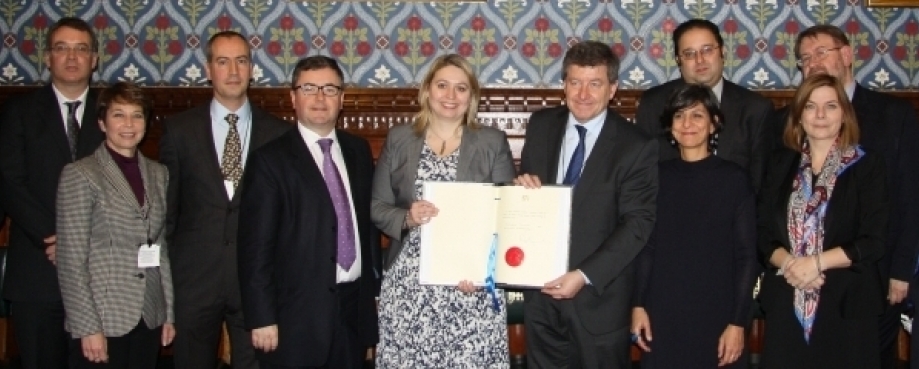
Today, ETI was among a few invited guests to witness a landmark in the UK’s efforts to eliminate modern slavery, when Parliamentary Undersecretary of State for Modern Slavery and Organised Crime, Karen Bradley ratified the International Labour Organisation’s (ILO) new Protocol on forced labour at the Palace of Westminster in London.
ETI’s Head of Knowledge and learning Cindy Berman said ratifying the ILO protocol demonstrates “impressive leadership” and added, “the UK is sending a clear message that it is serious about walking the talk on tackling modern slavery".
She said: “All credit should go to the CBI and the TUC in working with government to get this new protocol approved. It’s a great example of collaboration in driving forward an agenda in which all parties feel equally passionate and committed to tackling an abhorrent crime.”
The ILO advises that 21 million people worldwide are victims of forced labour – trapped in jobs they cannot leave – and US$150 billion in illegal profits are made in the private economy each year through modern forms of slavery.
With the UK’s Modern Slavery Act confirmed under law, the government now has the legislation in place to prosecute those companies and individuals that transgress the protocol, and to give victims of forced labour appropriate protection, access to remedy and to justice.
This is also one of the first concrete steps taken by any government to put the new UN Sustainable Development Goal 8.7 on modern slavery into practice.
According to Cindy Berman, ETI member companies and unions are keen to demonstrate the protocol in action.“Our corporate members, in partnership with trade unions and NGOs, want to set the pace for change on transparency, due diligence and access to remedy. They can offer models of good practice that others can follow.
“Core to tackling modern slavery is freedom of association. Where workers can negotiate their own terms and conditions of work, they are unlikely to be victims of forced labour. This is one of the critical building blocks of effective due diligence."
The ETI is developing new tools, training and guidance to help companies in tackling what is a complex issue.
“There are no quick fixes,” Cindy Berman said. “But there is an urgent need for leadership and commitment to bring about important changes. No single actor can do it alone, and the traditional ways of managing supply chains are no longer working. That’s why we need partners that are willing to engage and to stay the course."
Cindy Berman also said that the ETI will do whatever it can to promote the ILO’s 50 for Freedom campaign, seeking to persuade at least 50 countries to ratify the Protocol on Forced Labour by 2018.
"The UK was a global leader in bringing an end to slavery in the 18th century. It was amongst the first countries to ratify one of the earliest ILO Conventions on Forced Labour in 1930. This Protocol enables new legislation that is fit for tackling modern slavery in the 21st century," she concluded.
Released by The ETI Communications team
